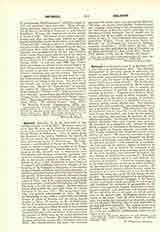

Helmold, historian, b. in the first half of the twelfth century; d. about 1177. He was a native of, or at least he grew up in, Holstein (Germany), and received his instruction in Brunswick from Gerold, the future Bishop of Oldenburg. Later he came under the direction of the saintly Vicelinus, the Apostle of the Wends, first in the Augustinian monastery of Faldera, afterwards known as Neumunster. He finally became a parish-priest at Bosow on Plone See. He wrote, at Gerold’s suggestion, a chronicle of the Wends (“Chronica Slavorum” or “Annales Slavorum”), the purpose of this chronicle was to demonstrate how Christianity and German nationality gradually succeeded in gaining a footing among the Wends, especially in the eastern portion of Holstein. As an eye-witness he gives a clear description in fluent Latin of Vicelinus’s self-sacrificing missionary labors, of the founding of the bishopric in Oldenburg, of the transfer of this bishopric to Lubeck when German commerce at the latter place had become more important than in the former city, of the spread of German influence among the Wends, of the merciless subjugation and extermination of these, and of the summoning to their lands of foreign settlers, principally Westphalian and Dutch. The work is divided into two parts: the first covers a period closing with the year 1168, while the second continues to the year 1171. This second part, however, was written subsequently to 1172. He drew his knowledge of the earliest period from the church history of Adam of Bremen and the Saxon records bearing on Henry IV, besides the life of Willehadus, the list of Ansgarius, and perhaps also a life of Vicelinus, but the summaries which he made of these records are unreliable. He is, however, our most important source of information for the history of his own period, his account of which rests on the verbal information of Vicelinus and of Gerold. His fund of information becomes noticeably meagre after the latter’s death in 1163. His trustworthiness has been very seriously questioned in recent times (see particularly Schirren, “Beitrage zur Kritik holsteinischer Geschichtsquellen”, Leipzig, 1876) owing to his antagonism towards the archbishops of Bremen and his partiality for the Oldenburg–Lubeck bishopric, but it should not be supposed that he was guilty of an intentional falsification of facts [cf. with Schirren’s observations and conclusions Wigger, “Ueber die neueste Kritik des Helmold” in “Jahrbucher des Vereins fur Mecklenburgische Geschichte”, XLII (1877), 21-63]. The chronicle was first published in 1556 at Frankfort on the Main, and finally in “Mon. Germ. Hist.: Script.”, XXI (1868), 11-99, and in “Script. rer. Germ.”
PATRICIUS SCHLAGER

